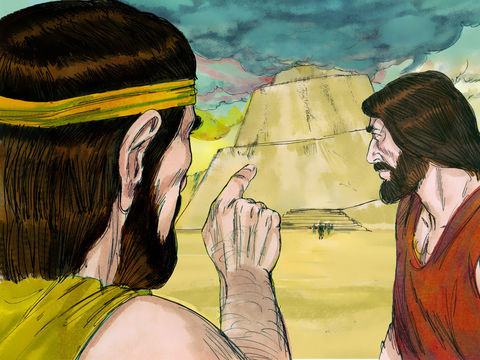Children’s Bible Program – Level 3: Lesson 18 “Forty Years in the Wilderness”
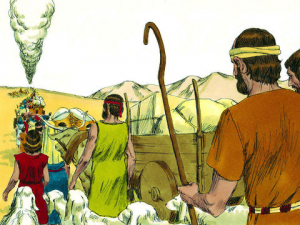
Sweet Publishing | FreeBibleImages.org
Read Together: Israel did not bring a good report during their wandering in the wilderness. During this time, Korah, Dathan, Abiram, and On stirred up the people in rebellion, saying Moses and Aaron should no longer be the leaders of Israel. God had something to say about that! He caused the earth to open up and swallow these rebellious men, their families, and all their possessions. After the rebellion was put down, the Israelites complained that Moses had killed the people of God. They gathered against Moses and Aaron, but again God saved them and sent a plague that killed 14,700 more people. After a victory over the king of Arad, the people started complaining again, calling the manna worthless. This time God sent fiery serpents through the camp which killed many of the people. After Israel wandered for forty years, the time finally came for them to inherit the Promised Land. God lead Israel to defeat and take the lands of Sihon King of the Amorites, and Og King of Bashan. The Moabites heard of Israel’s conquests and were afraid. Balak, king of Moab, sent for Balaam to curse Israel, but God would not allow it, but allowed Balaam to bless them instead. However, the Israelites started worshipping idols and marrying foreign women. The Lord became angry and sent a plague that killed 24,000 people. Time and again Israel tested God. Israel failed to keep the covenant they had made with God, but their deeds were recorded for our benefit so that we can learn from their mistakes.
Read Together: Numbers 16:1–32, 41–50; 21:1–6, 21–26, 31–35; 22:1–35; 24:10–13; 25:1–9
Discuss:
- Remind your child that God promised Israel the land of the Canaanites, Amorites, Hittites, Perizzites, Jebusites, and the Hivites (Exodus 3:7–8). Their conquests were in partial fulfillment of God’s promise.
- Ask your child what lessons they think we can learn from Korah’s rebellion. Use this as an opportunity to talk about God’s government and how we are to respect those God has put in leadership positions.
- Read 1 Corinthians 10:6–11 with your child. Discuss how we can get caught up in the same sins that Israel committed. Help them come up with some examples.
Review Memorization.
Deuteronomy 30:15–16 “See, I have set before you today life and good, death and evil, in that I command you today to love the LORD your God, to walk in His ways, and to keep His commandments, His statutes, and His judgments, that you may live and multiply; and the LORD your God will bless you in the land which you go to possess.”


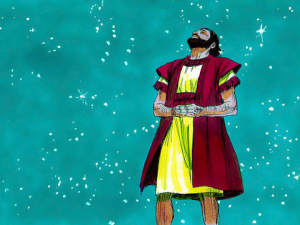
 Read Together: After the flood, people began to raise families, and gradually moved further and further away from where the ark had come to rest. The Bible tells us about the families of Shem, Ham, and Japheth, and how they began to populate the earth. We read about one man who became famous as a great hunter. This man’s name was Nimrod, and he was the grandson of Ham, one of Noah’s three sons. As his fame grew, he was idolized by many. In fact, some people began to look to Nimrod instead of God for protection and leadership. They called him “the mighty hunter before [“instead of” or “in place of”] the Lord” (Genesis 10:9). Remember, God had commanded the sons of Noah to fill the earth (Genesis 9:1). But proud Nimrod rebelled against God, building cities and a kingdom. One of the cities he built was the famous Babel, where the people began to build a giant tower, reaching into the sky.
Read Together: After the flood, people began to raise families, and gradually moved further and further away from where the ark had come to rest. The Bible tells us about the families of Shem, Ham, and Japheth, and how they began to populate the earth. We read about one man who became famous as a great hunter. This man’s name was Nimrod, and he was the grandson of Ham, one of Noah’s three sons. As his fame grew, he was idolized by many. In fact, some people began to look to Nimrod instead of God for protection and leadership. They called him “the mighty hunter before [“instead of” or “in place of”] the Lord” (Genesis 10:9). Remember, God had commanded the sons of Noah to fill the earth (Genesis 9:1). But proud Nimrod rebelled against God, building cities and a kingdom. One of the cities he built was the famous Babel, where the people began to build a giant tower, reaching into the sky.
 “We’ve got to speak truth to our neighbor, and any employer is our neighbor, in the context that God uses. … You can be a false witness of yourself, if you don’t tell the truth.”
“We’ve got to speak truth to our neighbor, and any employer is our neighbor, in the context that God uses. … You can be a false witness of yourself, if you don’t tell the truth.”
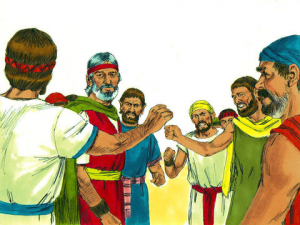
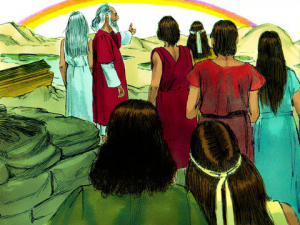
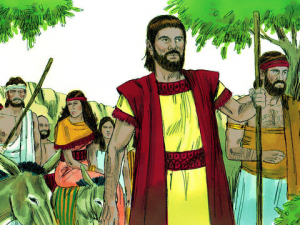

 The more things we like to do, the more common ground we’ll find with others. And as Mr. Ames said, the more versatile we are, the more effective we can be as Christ’s Ambassadors. God made a lot of people, and almost all of them have passions they love talking about. Being able to talk to many different people, about many different things, can improve the light in which people see you, and improve the light in which they see “that Church you’re in.” It’s good to have a Thing, but as Mr. Ames showed, it’s even better to have many.
The more things we like to do, the more common ground we’ll find with others. And as Mr. Ames said, the more versatile we are, the more effective we can be as Christ’s Ambassadors. God made a lot of people, and almost all of them have passions they love talking about. Being able to talk to many different people, about many different things, can improve the light in which people see you, and improve the light in which they see “that Church you’re in.” It’s good to have a Thing, but as Mr. Ames showed, it’s even better to have many.
